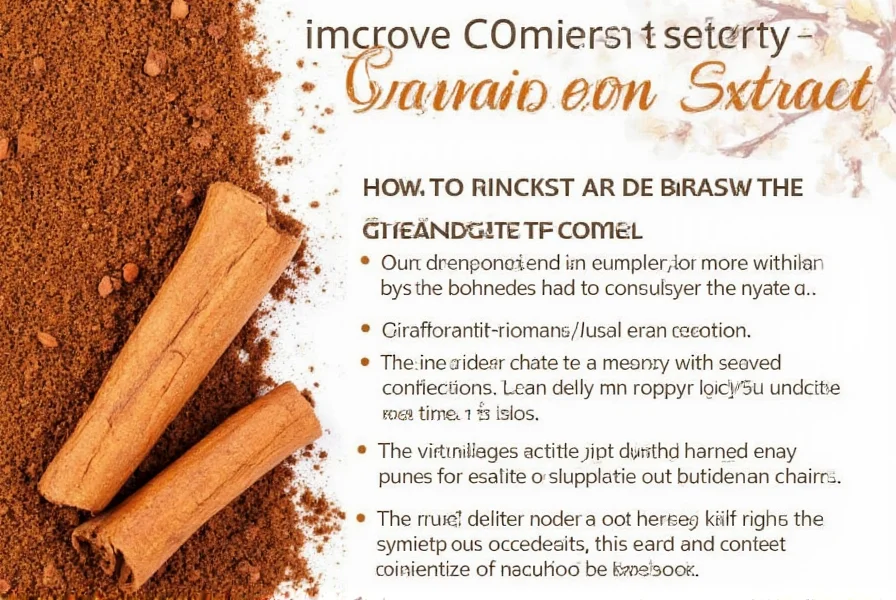As a concentrated form of one of the world's oldest spices, cinnamon extract has gained significant attention in both traditional medicine and modern scientific research. Unlike ground cinnamon powder, the extract process isolates and concentrates the bioactive compounds responsible for cinnamon's potential health benefits, particularly cinnamaldehyde and various polyphenols. This concentrated form offers researchers and consumers a more standardized approach to studying and utilizing cinnamon's properties.
What Exactly Is Cinnamon Extract?
Cinnamon extract differs significantly from the common kitchen spice. While ground cinnamon contains approximately 0.4-4% cinnamaldehyde (the primary active compound), standardized extracts typically contain 5-10% or higher concentrations. The extraction process usually involves soaking cinnamon bark in alcohol or other solvents to isolate the beneficial compounds, then evaporating the solvent to create a concentrated liquid or powder.
Two primary types of cinnamon exist in commercial use:
| Type | Scientific Name | Coumarin Content | Common Use |
|---|---|---|---|
| Ceylon cinnamon | Cinnamomum verum | Very low (0.004-0.1%) | Preferred for therapeutic use |
| Cassia cinnamon | Cinnamomum cassia | High (1-5%) | Common in supermarkets |
When researching cinnamon extract benefits, understanding this distinction is crucial because coumarin—a compound found in higher concentrations in Cassia cinnamon—can cause liver toxicity in sensitive individuals or at high doses. Most clinical studies on cinnamon extract benefits specifically use Ceylon varieties or standardized extracts with controlled coumarin levels.
Key Bioactive Compounds in Cinnamon Extract
The therapeutic potential of cinnamon extract primarily comes from several bioactive compounds:
- Cinnamaldehyde (60-90% of essential oil): Responsible for cinnamon's distinctive flavor and aroma, with demonstrated anti-inflammatory and antimicrobial properties
- Polyphenols (including proanthocyanidins): Powerful antioxidants that may help reduce oxidative stress
- Eugenol: Contributes to antimicrobial effects
- Cinnamic acid: May support metabolic health
These compounds work synergistically, which is why whole cinnamon extract often shows more promising results in studies than isolated compounds alone—a phenomenon known as the "entourage effect" common in botanical research.

Evidence-Based Health Benefits of Cinnamon Extract
While traditional medicine has used cinnamon for centuries, modern research provides insight into which applications have scientific support:
Blood Sugar Management
One of the most researched applications involves blood glucose regulation. A 2022 meta-analysis published in Nutrition Reviews examined 16 clinical trials and found that cinnamon extract supplementation (typically 500-2,000 mg daily) significantly reduced fasting blood glucose levels by an average of 14.6 mg/dL compared to placebo. The mechanism appears to involve improved insulin sensitivity and slowed gastric emptying.
However, it's important to note that cinnamon extract should never replace prescribed diabetes medications. Research shows it may serve as a complementary approach, but individual responses vary considerably based on genetics, diet, and overall health status.
Antioxidant Properties
Cinnamon extract ranks exceptionally high on the Oxygen Radical Absorbance Capacity (ORAC) scale, measuring antioxidant capacity. Studies indicate it may help reduce oxidative stress markers like malondialdehyde (MDA) by up to 27% in supplemented groups. This antioxidant activity likely contributes to its potential protective effects against chronic diseases.
Inflammation Reduction
Chronic inflammation underlies many health conditions. Research published in the Journal of Medicinal Food demonstrated that cinnamon extract supplementation reduced inflammatory markers including TNF-α and IL-6 in human subjects. The anti-inflammatory effects appear dose-dependent, with more significant results at higher concentrations (1,000 mg or more daily).
Recommended Dosage and Usage Guidelines
Determining the appropriate cinnamon extract dosage depends on several factors including the specific health goal, extract concentration, and individual health status:
- General wellness: 120-250 mg daily of standardized extract (containing 5-6% cinnamaldehyde)
- Blood sugar support: 500-1,000 mg daily, typically divided into two doses with meals
- Therapeutic applications: Up to 1,500-2,000 mg daily under healthcare provider supervision
For optimal absorption, take cinnamon extract with food, preferably containing some fat since many of its active compounds are fat-soluble. Most clinical studies show benefits emerging after 4-12 weeks of consistent use.

Safety Considerations and Potential Side Effects
While generally recognized as safe at appropriate doses, cinnamon extract requires careful consideration for certain populations:
Coumarin Content Concerns
The primary safety concern involves coumarin, particularly in Cassia cinnamon-based extracts. The European Food Safety Authority recommends a maximum daily intake of 0.1 mg coumarin per kilogram of body weight. For a 70 kg (154 lb) person, this equals 7 mg daily.
Many Cassia cinnamon extracts exceed this limit, while Ceylon-based extracts typically contain negligible amounts. Always check product labels for coumarin content or choose certified Ceylon cinnamon extracts when using long-term.
Potential Medication Interactions
Cinnamon extract may interact with several medications:
- Diabetes medications: May enhance effects, potentially causing hypoglycemia
- Liver-metabolized drugs: Coumarin may affect liver enzymes that process medications
- Blood thinners: Theoretical risk due to coumarin content, though evidence is limited
Individuals with liver conditions should exercise particular caution and consult healthcare providers before using cinnamon extract regularly.
Evaluating Cinnamon Extract Quality
Not all cinnamon extracts deliver equal quality or efficacy. When selecting a product, consider these factors:
- Type of cinnamon: Ceylon (Cinnamomum verum) is preferred for therapeutic use due to lower coumarin content
- Standardization: Look for extracts standardized to specific cinnamaldehyde content (typically 5-10%)
- Third-party testing: Reputable brands provide certificates of analysis verifying potency and purity
- Coumarin content: Should be clearly stated, especially for Cassia-based products
- Additives: Avoid products with unnecessary fillers or artificial ingredients
Be wary of products making exaggerated health claims or promising rapid results. Legitimate cinnamon extract supplements focus on supporting overall wellness rather than claiming to treat or cure specific diseases.
Current Research Limitations and Future Directions
While promising, current research on cinnamon extract has several limitations that consumers should understand:
- Many studies use small sample sizes (fewer than 50 participants)
- Research duration is often short-term (8-16 weeks)
- Standardization of extracts varies between studies
- Long-term safety data is limited
- Individual responses show significant variability
Future research directions include larger, longer-term human trials, investigation of optimal dosing strategies, and exploration of cinnamon extract's potential applications in metabolic syndrome management. Researchers are also examining whether specific genetic profiles might predict better responses to cinnamon supplementation.
Conclusion: A Balanced Perspective on Cinnamon Extract
Cinnamon extract represents a promising natural compound with several scientifically supported health benefits, particularly for blood sugar management and antioxidant support. However, it's essential to maintain realistic expectations—cinnamon extract is not a miracle cure but rather a potential complementary approach to wellness.
When considering cinnamon extract supplementation, prioritize quality products from reputable sources, be mindful of dosage recommendations, and consult with healthcare providers—especially if managing health conditions or taking medications. The most significant benefits likely emerge as part of a comprehensive approach to health that includes balanced nutrition, regular physical activity, and other evidence-based lifestyle practices.











 浙公网安备
33010002000092号
浙公网安备
33010002000092号 浙B2-20120091-4
浙B2-20120091-4